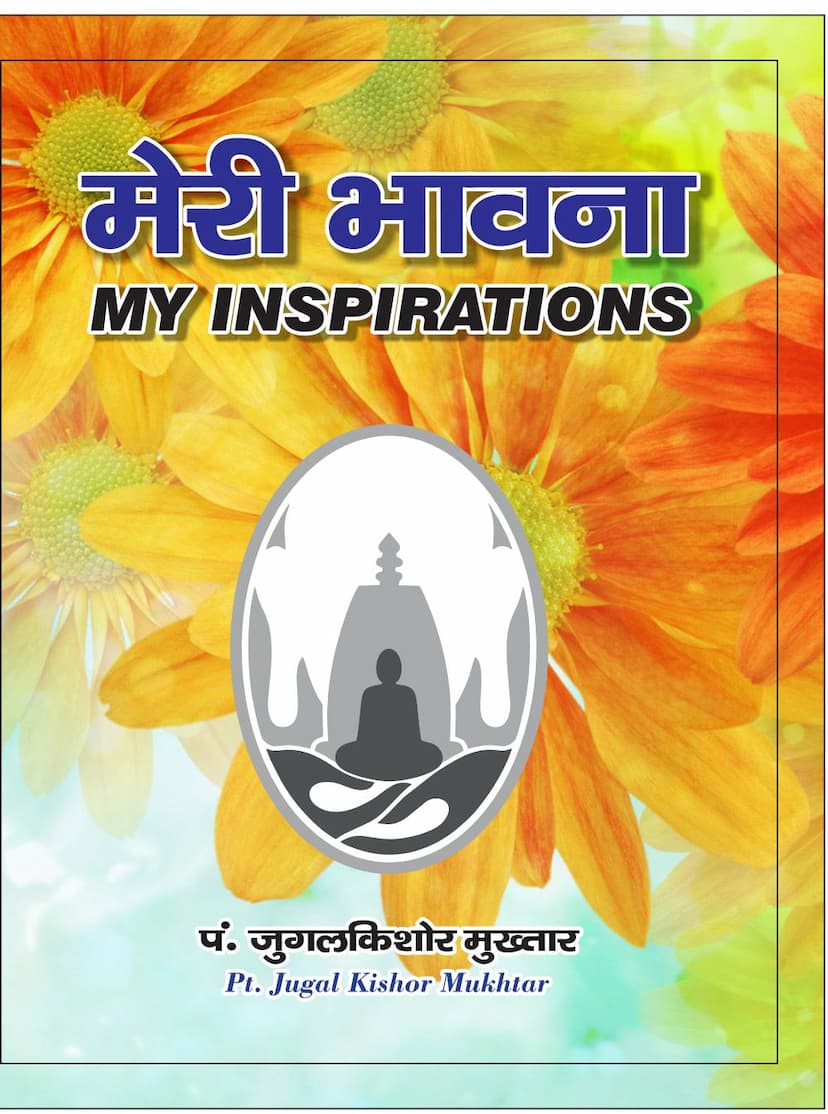Meri Bhavna
Added to library: September 2, 2025

Summary
This document is an English translation of "Meri Bhavna" (My Inspirations), a prayer or aspiration written by Pt. Jugalkishor Mukhtar. The book is published by Veer Seva Mandir Trust and the English translation is attributed to Barrister C.R. Jain (1921).
Here's a summary of the content:
Introduction and Context:
- Book Title: Meri Bhavna (My Inspirations)
- Author: Pt. Jugalkishor Mukhtar, a significant scholar and thinker in Indian civilization and culture, with a focus on Jain literature, art, and archaeology. He was instrumental in establishing the Veer Seva Mandir in Delhi and edited the research journal 'Anekanth'. He was also associated with various reformist movements and a vocal critic of social ills. "Meri Bhavna" was composed in 1916 and is considered a universally accepted prayer, transcending religious boundaries.
- Publisher: Veer Seva Mandir (A Research Institute for Jainology) in New Delhi.
- Veer Seva Mandir: The text provides a brief history of the Veer Seva Mandir, highlighting its establishment in 1929, its role in publishing research on Jain literature and philosophy, its extensive library (including ancient manuscripts), and its commitment to providing free accommodation and study facilities for researchers without discrimination.
Core Aspirations and Principles (as expressed in the verses):
The central theme of "Meri Bhavna" is a set of profound aspirations for personal conduct, societal well-being, and spiritual progress, deeply rooted in Jain principles. The verses articulate a desire for:
- Adherence to Dharma: The opening verses quote from Mahavir Vani, emphasizing the auspiciousness of religion, the importance of non-violence (Ahimsa), self-control (Sanjam), and penance (Tapas). It highlights that even gods revere those whose minds are devoted to Dharma.
- Mindful Conduct: The importance of cautious and mindful actions in all aspects of life – moving, standing, sitting, sleeping, eating, and speaking – to avoid accumulating negative karma is stressed.
- Universal Forgiveness and Friendship: A deep aspiration for universal compassion, forgiveness towards all living beings, and a feeling of friendship towards everyone, while harboring no enmity towards any.
- Veneration of the Enlightened: A strong desire to be inspired by and devoted to enlightened beings who have conquered passions (Rag-Dvesh, Kamadik), possess profound knowledge, and guide others towards salvation. These enlightened beings are referred to by various names like Buddha, Vir (Mahavir), Jin, Hari, Har, and Brahma, indicating a universal recognition of spiritual attainment.
- Ascetic Virtues: Aspiration to embody the qualities of enlightened ascetics (Sadhus) who are detached from worldly pleasures, possess equanimity, are dedicated to the welfare of themselves and others, practice self-denial without regret, and alleviate the suffering of the world.
- Righteous Conduct and Company: The desire to always keep company with virtuous individuals, to be inspired by their teachings and conduct, to avoid harming any living being, to refrain from lying, and to be content with what one has, avoiding coveting others' possessions or wives.
- Overcoming Negative Emotions: A strong resolve to remain free from pride, anger, and envy, to deal with others with simplicity and truthfulness, and to strive to benefit others whenever possible.
- Compassion and Equanimity towards All: A wish to maintain friendly relations with all beings, to have boundless sympathy for the distressed and afflicted, and to remain tranquil and undisturbed even in the presence of the wicked, cruel, or those who stray from the righteous path.
- Appreciation of Virtue and Service: A desire to be filled with love upon seeing virtuous individuals and to find joy in serving them. The aspiration to be grateful, free from malice, to always seek to assimilate virtues, and to not focus on the faults of others.
- Integrity and Steadfastness: The determination to remain unwavering in the path of righteousness, regardless of praise or criticism, wealth or poverty, long life or imminent death, or any form of threat or temptation.
- Inner Strength and Resilience: The aspiration to remain grounded and unshaken by happiness or sorrow, to overcome fear of intimidating places or situations (mountains, rivers, cremation grounds, forests), and to develop inner fortitude to face separation from loved ones or association with the undesirable.
- Universal Well-being and Progress: A prayer for the happiness and freedom from distress of all beings, for the renunciation of hatred, sin, and pride, and for the prevalence of joyous celebrations. It expresses a wish for Dharma to be discussed in every home, for evil deeds to become difficult, and for all humans to achieve the purpose of their lives by enhancing their wisdom and character.
- Societal Harmony and Justice: A prayer for the absence of calamities and terror, for timely rains, for righteous and just governance by kings, for the absence of diseases and famines, and for people to live in peace. It strongly advocates for the ultimate prevalence of the supreme Dharma of Ahimsa for the welfare of all.
- Mutual Love and Truthful Speech: The aspiration for mutual love to prevail in the world, for delusion to be distant, and for no one to utter offensive, harsh, or unpleasant words. It encourages people to wholeheartedly contribute to the progress of their country and to endure hardships with joy by understanding the true nature of things.
In essence, "Meri Bhavna" is a comprehensive guide to ethical living, spiritual aspiration, and the cultivation of a compassionate and righteous society, presented as a heartfelt prayer.